Neda Aria's Blog, page 14
July 27, 2022
Clashes of Self and Identity in Sylvia Plath's Ariel Through Deconstructive Lens
Self and Identity as two separate but interconnected Phenomenon in deconstructive approach, have been typified outstandingly in Plath's Ariel. The derision of poetess toward the external factors, namely in social and political contexts appears to be pertinent to her latest poems. The duality of Sylvia Plath as self and Plath as daughter, as her mother and others expected her to be is a crucial point in reciting her poetry. The schizoid character of postmodern identity has no option but to experience the uncanny (Brain, 65) and to face the double(Ibid).
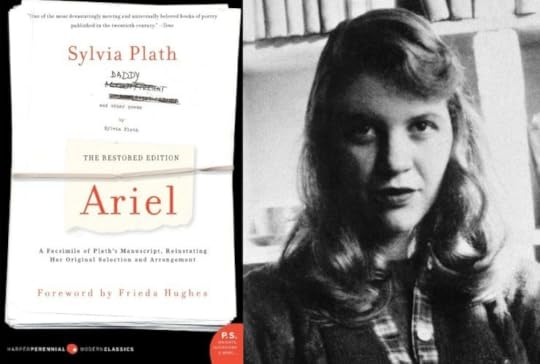
The attitude towards the intrinsic malady woven into poems in fact paves the way for deconstruction. Since deconstructing acts like a surgical operation applied to texts and works, thus analyzing human's psyche opens a good scope in this field. The fact that every man is born with a double, the entire human's struggle is to protect this spontaneous creation of double in order to preserve life. When "I" is repeated, the self and its replica are called to question.There is obvious ambivalence between the persona's identity and individuality in most of Plath's poems in Ariel. The despondent chant that even the most grotesque and comic poems conceal beneath their profound layer is not dissimilar to Hemingway's Iceberg principal. Although every text might have an icy and solid surface, this does not merely imply that accessing to the heart of the work is not feasible.
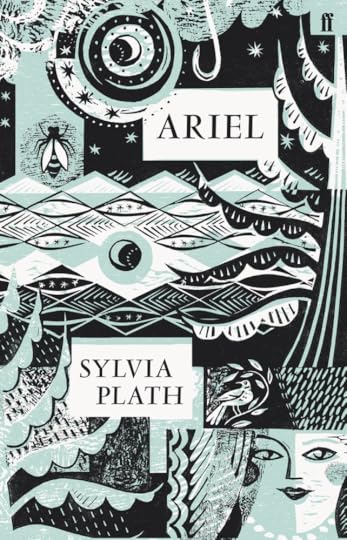
Identity in question, Motifs of Double and DualityTo discuss the self, one should recollect nd summon up the challenging notion of Identity and its play of doubleness and duality. The whole life of an artist is summarized in one quest that is the process through which could find Identity. Almost inevitable, all of Plath's poems intentionally allude to indefiniteness of gender to remove all identities feasible from the narrator individuality.
To quote Tracy Brain in her blockbuster book, The Other Sylvia Plath that was one of literary breakthroughs of twenty century would be conceptualization of Identity concept regarding Sylvia Plath's own identity. Brain provides the reader with Plathian Doubleness (Brain, 121) with the amazing hint to Sylvia Plath's thesis on Dostoyevsky's use of double in her mastering masterpiece, M.A project. Therefore, she was not only unfamiliar with this sort of literature, focusing on characters and their doubles, but also a qualified and specialized enthusiastic about the so-called subject matter. Taking into account the doubling of her own self, the genderless speaker of Plath's Ariel with no specific nationality and gender colored a new cubism in the canvas of her poetry.
In "Tulips", taken from The collected poems of Sylvia Plath edited by Ted Hughes, the persona's loss of self during her hospital experience is portrayed via these lines, she weightlessly feels free from all earthly belongings that they "catch onto her skin"(Line 25,P.161) like "little smiling hooks" (Ibid):
I am nobodyI have nothing to do with explosions.I have given my name and my day-clothes up to nursesAnd my history to the anesthetist And my body to surgeons...........................................................................................................Now I have lost myself (Lines 6-11)Watching her identity recede, she sees the tulips and everything like the marriage affixed ring as a kind of entrapment. The petulance of speaker's voice here has been mixed with artistic frenzy of its creator's mind.
Entrapment of "I" in Ariel poemsThe conceptual interpretation of "I" has been reiterated in Ariel poems. One's being is shaped around this pronoun and left the modern criticism unjustified and unwarranted in superfluous understanding and perception of this mystified entity. The fact behind these repetitions affirms the unity of "I", but at the same time casts it into doubt and ambiguity as well. As in Derrida's Critique cited in Porritt, (328) "Surpassing Derrida's Deconstructed Self" "...sense of self almost perishes."(328), when the unity of signified/signifier would be ruptured and ripped apart through the extension of repeated "I am I, I..."In another word, articulation of "I" is masking the absence of self, or to use Derrida's terms, the voice masks an "always already absent presence".
Considering the fact that "I" could play the external and emphatic stress for the very sign of self, nonetheless this intruding pronoun poses the legitimacy of self into question. As a matter of fact, "I" deceives one into fallaciously impression of a singular Self.To broaden Derrida's philosophy further, "I am I am I", is as if the "I" is trapped between two opposing mirrors. Consequently, the origin appears to be unattainable since "the reflection, the image, the double splits what it doubles."(325). self-identity is multiplied within the frame within frame of infinite range and as a result there is no self entity of "I" who claims "I am I".
The lack of self-identity emerges in one of Plath's illustrious poem titled "Daddy", in which the origin of character is irretrievably lost. The poem is a notable parody of distorted identity, where the language itself has come to facilitate the narrator's schizophrenic psyche in achieving a verbal that is true to its fragmentation and inconsistence. The instability of Daddy's gender and masculinity implicitly diminish and cheapen the patriarchal supremacy and power. To identify the foot and the root of one's origin, in the daughter, duality of two racial heritages neutralize each other in a grotesque way. This degeneration of identity tyrannizes harshly with applying the verbal language true to this atmosphere.
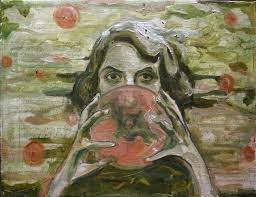
Despite all doubtfulness and improbability which govern the identity in various shapes, In "Lady Lazarus", Plath refers to her I-affirmation that is inevitable:
Yes, yes Herr ProfessorIt is ICan you deny? (Collected Poems p.246, Line 79)
These paradoxes of self-affirmation along with self-rejection in contradictory way have extravagantly contributed to unsteadiness of identity itself.
The fragile position of both identity and language that the poem shapes and figures around it can be observed through the repeated words, putting the idea of assurance and as well uncertainty forward. As if the speaker seeks to draw the spectator's approval and permission via repeating and rephrasing. Since replicating implies that the speaker is not confident about conveying her ideas properly. "I" as the most significant of Self- Identity has been rendered to "Ich", the German equivalence for the pronoun "I". Applying "Ich" could be deemed as a reference to Plath's double racial identity and at the same time regarded as a closure that the pronoun "Ich" connotes with its disarticulation and suffocation, due to consonant ending.
As a result, it frustrates any self-definition and this selflessness has occupied most of Plath's Ariel poems.
In contrast to "I" that is free and at least carries liberation in its articulation, however there are some obstacles and shortcomings in its clarity and restriction of defined range, "ich" seems to be timid and unpronounced.
The tarnished individuality presides over the poems and the disturbing paralysis of this realization would lead the character to a sort of passivity and subjectlessness. The impossibility of any self definition makes the narrator come terrifyingly close to depersonalization and dehumanization, that means equating people and object to indicate devaluation of human life and relations. As "Applicant" depersonalizes human's relationships and affiliations in this way:
I noticed you are stark naked.How about this suit-Black and stiff,but not a bad fit.Will you marry it? (Collected Poems p.221, Lines19-22)
Marrying to black and stiff suit is the death of all conjugal matrimony. Personification is used to undermine the integration of human being's individuality. Ariel poems are the exact mirror to question identity and everything relevant to do so. The "I" is trapped, dismembered and equated to be taken for granted like commodity. This is the culpability and blameworthiness that the modern human has to pay for price of industrialized machinery world. "Cut" is looked upon as one of brilliant cases in point:
What a thrill--My thumb instead of an onion....................................Of skin,A flap like a hat,Dead white.Then that red plush (Collected Poems, P235, Lines 1-8)To personify the injured finger here as a result of dismemberment, the poetess attempts to incarnate the solo finger by addressing it:O myHomunculus, I am ill.I have taken a pill to killThe thinPapery feeling (P235, Lines 22-26)
Undoubtedfully it must be the thumb that the speaker is talking to, since it is the shortest finger, like a homunculus and dwarf.Taking the medicine as narcotic and sedative to soothe and alleviate the pain of injured finger is in fact to heal the separated and dehumanized self and accordingly to kill the depersonalization that is like a papery feeling. Paper can be regarded as a white board in which the identity would define itself. But "Papery feeling" is flimsy and frail. Feeling like a paper is an absolute acceptance of depersonalization and devaluation of human life. Also one may assume that paper is associated with formal atmosphere and any social ritual issues. As it is previously declared here that depersonalization and fragmentation is a distinguishable trait in Ariel poems, the researcher would have a preference to end this part of discussion with Sylvia Plath's apparent personification of dominant images in her poem "Elm", the 24th line, she fabulously writes:
"The moon, also, is merciless". (Collected Poems, 192)
Assuming the moon to be merciless like a living creature is the grotesque image of demanding and reification of human's characteristics.
The objectification of self that has been atrophied and emaciated in socioeconomic atmosphere in consequence of World War II would be a justification to move toward scrutinizing the phenomenon of self.
Phenomenon of SelfThey stuck me together with glue (Collected Poems222)To unravel the complex network of self entity would look to be unfeasible. Notwithstanding the sense of self per se could be determined by what one perceives from the atmosphere. The psyche is trapped within the body frame. As discussed in previous section, the external representative of self, the so called "I" can not substantiate and prove the entity of self. In another word the inability of "i"in self-confirmation has cast the credibility of self into doubt and suspicion. If "I"is signifier, the self as a reflector might be the signified. But vice versa is potentially probable, self as signifier and "I" as signified. As this interchangeable transaction exists, subsequently the correspondence between "I" and self is like orbiting a circle, infinite, repeatable and substitutive. This incorporeal and abstract splitting up of self is perverted symbiosis of persona. Although this falsification of self makes the sustainability of human's life possible, otherwise there would not be any incentives to live upon it.
Derrida's notion of self, cited in Porritt (323), argues that "Derrida dismantles the concept of "self" as a unified, identifiable presence or entity. Derrida specifically views the self as "split", the self is therefore unable to provide a solid foundation for meaning". In proportion to Derrida's contribution to deconstruction of self (ibid), self is not a unified, singular and identifiable entity, but only a phenomenon created by human language.
The aesthetic self of artist is so susceptible and perceptive that when the quest for its definition and discovery fails, this feeling of gloom and frustration would lead the character to mental breakdown and psychological disorder. One should not ignore the fact that accessing to the resources of profound feelings often occurs in mental breakdown mood. Knowing the fact that Plath was a psychopath suffering from psychic collapse sporadically, that is why Plath's hospital writing is full of delicate and passionate description and sketch. The tangible fluctuation between self-loathing and self-recognition would lead the persona to a sort of schizophrenic disposition along with experiencing polarities of a self that has been divided and fragmented in this ill at ease situation of mind.
Bibliography and Works Cited:Brain, Tracy. The Other Sylvia Plath. Edinburgh: Longman, 2001.Plath, Sylvia. The Collected Poems. Ted Hughes,Ed. New York: Harvard and Row Pub,1981.Porrit, Ruth. Surpassing Derrida's Deconstructed Self. Women's Studies-Vol 21,PP323-338, Golden & Breach Publishers S.A,1992
Article Source: https://EzineArticles.com/expert/Talieh_Sakhamanesh/384997 Article Source: http://EzineArticles.com/2700065July 13, 2022
Postmodern Prose - How to Read Them and How to Deal With Them
The word postmodern itself indicates experimentation with conventions, rules, and previously accepted standard of communication. So when we talk about postmodern prose, we are looking at a piece of writing that will push and challenge normal writing conventions and structure such as grammar, punctuation, etc.Let's take examples of postmodern prose classics such as Thomas Pynchon's Gravity's Rainbow. If one goes into the book expecting to have grammatically correct sentence structure and conventional narrative plot that follows a protagonist around through a beginning, middle, and end, one would be severely confused and disappointed by the first chapter.

A good step to take in approaching such novels requires the following mental steps:
1) Expect the unexpected. Breaking expectations is a key attribute of any postmodern works. By suspending one's common expectations, one is less likely to toss the book after the first page simply because it doesn't follow what you are use to.
2) Suspend personal judgment. People often times wrongly equate something is 'objectively' good with personal, subjective judgment such as "I like this book" (which means "the book is good") or "I don't like this book" (which means "the book is bad").
3) Be "generous" in your reading. In other words, when something does not make sense to you initially, don't assume that the author is incompetent and write the whole novel off. Give benefit of the doubt that writers make certain decisions for a purposeful effect.
For example, one of the difficulties of reading Gravity's Rainbow is the full of dense, obscure, and specialized language understandable only to people who's profession and education uses that particular jargon. Instead of seeing this writing decision as a "fault" of the novel, take into consideration that perhaps the writer is utilizing specialized jargon as a method to point out the increasingly alienating partitioning of knowledge and of society during the novel's time period.
Approaching works of literature or works of art that challenges conventions often require some patience and effort on the viewer. Unlike the consumer culture where everything is catered for ease, convenience, and instant gratification, postmodern products asks its viewers to reflect, think, and question one's perspective and values.
Article Source: https://EzineArticles.com/expert/Derrida_Flynn/405313 Article Source: http://EzineArticles.com/2870320June 22, 2022
Fluidism Philosophy - Alternatine To Pop Postmodernism
"Pop Postmodernism" is what I call the popular, exaggerated idea that human beings cannot share common experiences of the world. Individual people are too different to cooperate naturally. Only power mongers establish standards to control individuals and civilizations according to power-mongering policies.

A Dead End ViewI believe that this point of view has run rampant for too long. It has stabilized as a standard in its own right, thus contradicting its own doctrine against standards. Pop postmodernism in art and in philosophy simply has disabled civilization. Thinkers who inspired this view behaved as young children revolting against considerable life experiences of seasoned adults. They acknowledged no common beauty, no common truth, and no common good. "Beauty", "truth", and "good", in fact, were suspicious words, with no possibility of naturally occurring, shared meanings.Ironically, the only truth that has prevailed among these thinkers is the truth that there is no truth. Such a truth that destroys itself renders the whole mindset dysfunctional.
Senses Do Not LieI propose that a large body of sensory evidence supports the belief that human beings actually do have perceptions similar enough to call the same. Perceptions might not be exact, from individual to individual, but they are self-similar, which is close enough. Self-similar perceptions, then, lead to self-similar sensations, feelings, meanings, and purposes. Resonances, harmonies and symphonies occur in this sea of self-similarity. Shared forms, then, arise in minds, in societies, and in whole cultures.Order, thus, exists beside chaos. Order actually arises from chaos. Polar opposites that work together in this manner comprise the foundation of all human existence. Postmodern philosophy seems to focus on deconstruction, rather than on construction, which is the inevitable byproduct of a continually rhythmical cycle of opposite (yet integrated) forces.
Conceptual Confusion-Perceptual AccordWhere do human beings see formation and deformation as differences in a mass that is the same?I suggest fluids. Fluids, although plastic and forever morphing, form bubbles, cells, membranes, veins, and other pleasing, natural patterns. Life itself emerged from these patterns. Human bodies developed around these liquid patterns. We are complex bags of seawater walking on bony stilts.Human bodies are normally very similar, consisting of a head, two arms, two legs, ten fingers and toes. These anatomical structures express our perceptions and experiences. Individual minds do not exist apart from similar physical bodies that house them. Only minds severely divided from bodies think that people are too different to realize common standards.
Fluidism In Place Of PostmodernismI propose that a fluid understanding of the cosmos can nurture standards that are attractive to the largest number of people. A fluid understanding allows for both construction and deconstruction in a healthy balance. I call such an understanding by the same name that I call the related style of my art, "fluidism".Where pop postmodernism looks angrily upon standards, fluidism acknowledges standards that give higher meaning and purpose to societies. Where pop postmodernism rests on mental conceptions, fluidism actively engages physical perceptions.
Article Source: https://EzineArticles.com/expert/Robert_Kernodle/919226 Article Source: http://EzineArticles.com/5890469June 2, 2022
Writer vs. Writer: Alex Dew
In this post, we are chatting with an artist of all trades, Alex Dew. Alex is a full-time freelance singer-songwriter for producers globally, from EDM to Rock, so according to him, he is always writing lyrics and for him "Song lyrics are like mini-stories!". I found him through his novel which he advertised as transgressive fiction so, as I was curious, I thought you may be too. Let's get to know this mysterious guy.
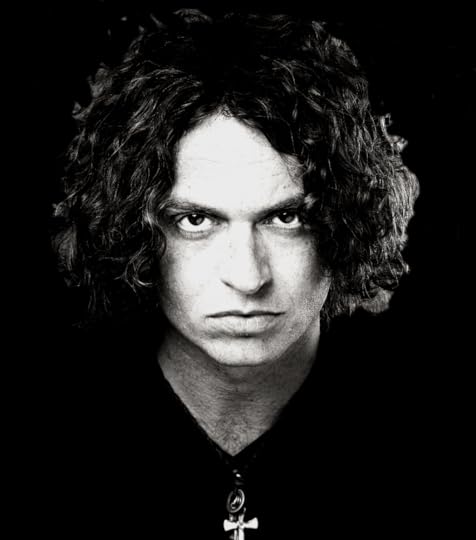
Hi Alex. Glad to have you here for this chat. Let’s start with your novel. Tell us why did you write it?
The drive behind writing my novel came from the fact that as long as I can remember, I have always wanted to complete a novel. Being a song-writer I am always writing, so a “Word-Smith” of sorts but lyric writing is very similar to writing poetry, a short form so to speak.
Without spoilers, can you tell us what is this book about?
I am very “Cinematically” minded, I just love films, which was also part of my inspiration. As I went on the journey of writing my book there was a part of me that was thinking like a film director, maybe Tarantino? And in the more surreal parts David Lynch!
Writing The Guy was a form of therapy, a release of sorts after my Roller-Coaster” ride of a life… I am very much an automatic-writer, The Guy was not planned at all… I just set aside an hour a day (I used a stopwatch) and just wrote, I guess just letting it evolve itself.
The Guy is a UK “Freelance” assassin for various criminal gangs within Europe, he is also a part-time singer in a covers band, just for “Ego” reasons! He is most definitely on the ‘Spectrum’, has OCD (Times everything with a stopwatch) and it’s never 100% clear if he is a true “Sociopath”, yes he has a tendency to be “Ultra-Violent” but he is also very empathetic in many aspects, maybe too much so! Perhaps a highly sensitive emapth.
The Guy is Jason Bourne meets American Psycho with Tarantino directing. In places darkly funny. His journey within the book twists and turns, as he finds himself embroiled in inter-gang politics and has to negotiate his way out of some life or death situations with both cunning and violence.
The story is told through The Guy’s eyes and is interwoven with the most surreal daydreams and “Dreamscapes”.
The end chapter leaves more questions on the table than answers.
For me Transgressive fiction and non-fiction are the best way to express oneself and what is wrong with our society. Do you reason to categorize your writings under this genre? If yes, why?
I feel Transgressive writing lends itself very much to commentating on how confused today's society is!
The Guy explores a lot of the “Plastic” elements of modern life and details these observations and feelings he has towards them. Has technology set us free? Is modern days society’s obsession with safety truly damaging to the collective consciousness? used against us as a means of control for authoritarian bodies with riches promised. Society has always been this way but it seems recent the amplification is immense! …. Highlighted of course by the Pandemic.
Transgressive writing seems the only true genre that enables an authentic exploration of these matters, but even with widely accepted “Self-publishing” there is always a danger of “Cancellation”.
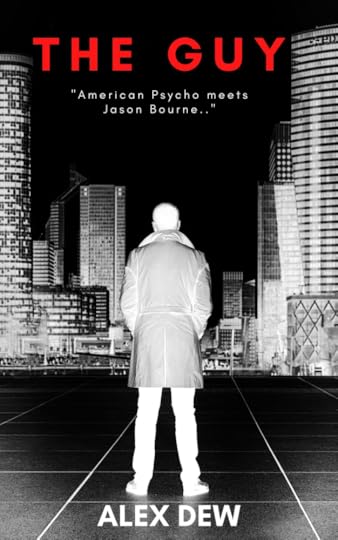
Who is your biggest inspiration when it comes to writing?
I don’t have one writer who is my main inspiration, my mind is a little bit too, shall we say Mercurial, to be that decisive!
But within the more “Left-field” genres, as a teenager, books by William S. Burroughs and Charles Bukowski struck a chord. In stark contrast, I am a big fan of the Uk writer Alan Bennet for his honest, straightforward observational style!
Are you currently working on other books? Can you tell us about your future or current projects?
I am currently sketching out an idea for a book based on the “Ancient Astronaut” theory, the working title is “The Return”, it is set in the near future and is about the prophesied return of the legendary civilization known as the Anunnaki, prophesied in the ancient tablets found in Sumeria (Now Iraq), this is a massive topic with books written by Zecharia Sitchin (The 12th Planet) and Erich von Däniken (Chariots of the Gods) amongst many others including of course the highly popular Ancient Aliens TV series.
The book will explore the incredible effect on humanity with our “Seeding” forefathers' return, how they interact and the consequences upon global governments faced with the arrival of a much more advanced civilization.
I am an “All things” Alien fanatic so I’m hoping the book will be deliciously self-indulgent! LOL
Unlike “The Guy” it will require much research and a much more intricate plat outline, it’s at this stage at the moment.
About the publishing process. Would you mind explaining how the did you get your book published? As Transgressive genre is quite a difficult and risky genre to publish classically, I’m curious to know more about your experience in this field?
In regards to publishing The Guy, you are so right about the apprehension and acknowledgment of risk in publishing anything Transgressive, particularly in the wider phenomenon of “Cancel Culture”, for a start my book title: The Guy, the title alone could, tenuously I must say, be controversial with the Transgender activists! …. Which seems to me ridiculous as The Guy is a nickname of my anti-hero and has no direction or even inference towards any gender classification issues!
I published through Amazon KDP, self-published. I self-edited the book myself and one of the thing that was hard was the editing process, and proofreading, yes there are probably mistakes but that striving for “Perfection” can be a stalling block, so I’d say, do your best and don’t be scared to make mistakes.
The KDP process is pretty simple, edit a Word document, check it and upload it, definitely check it through with the mock Kindle viewer tool.
As my book is very violent in places and contains many curse words, I assigned it to the adult content section. I also added a text warning about not reading it if one is offended by violence and swear words.
When I pressed “Publish” after setting the price (A varying degrees of options on this!) I was apprehensive Amazon would “Red flag” the book, but they didn’t!
The Guy is currently on Amazon to purchase with a Free short sample and to be honest I am still planning a promotional campaign for 2022.
So in summary my advice is you want to go down the KDP Amazon path, just “Start” and maybe give oneself a deadline!
I feel Transgressive writing lends itself very much to commentating on how confused today's society is!
What advice would you offer to writers, many of whom are struggling to be creative right now, on how to keep momentum on the work when the world around feels somewhat stranger than fiction?
My advice to writers struggling to be creative is very simple: Decide then commit to writing a book, step back and realistically assess how much time one can spend writing the book on a daily basis, 30 minutes, 1 hour? Get a stopwatch and sit down and write every day, with no expectations. Perhaps allot 2 sessions a week to brainstorming, researching, but again with a stop-watch as per the allotted time. No social media distractions in this block of time, no distractions and in the words of Nike “Just do it”. Sometimes one has to “Go against oneself” to achieve goals.
Finally, be honest are you writing for fame and fortune? Or because you love the creative process of creating the “Writers” world? If your answer is predominantly the former and you don’t particularly like the creative process, as in writing a book strokes your ego, seriously look at why you are writing!!
Thank you Alex for this interesting chat. Look forward to future collaborations.
If you're interested to know more about Alex and his book, here's some links to follow:
The Guy: American Psycho meets Jason Bourne in a David Lynch Dreamscape with Tarantino directing...... eBook : Dew, Alex: Amazon.co.uk: Kindle Store The Guy-Book - Home | Facebook THE GUY (Book) | Alex Dew (alex-dew.com)May 25, 2022
Critical Analysis of the Philosophy of Deleuze
Deleuze belongs to school of Postmodern, post-structuralist thought. In his philosophical works, he has addressed questions on art, literature, science and philosophy. He has used the Cinema and conceptualized it into a philosophical system.
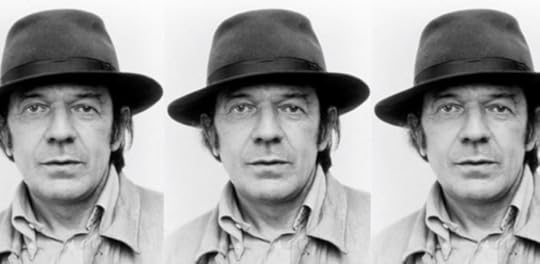
According to him questions on Science, Literature, Art and Philosophy are extensions of the questioning power of life. Post structuralism responded to the impossibility of founding knowledge either on phenomenology or the structures of language. This argument, a flawed one poses serious questions for philosophy. Phenomenology or the appearances of the contents of consciousness and language as a semantic structure of signs (the signifier and the signified) have structures inherent in them. There is no empty sign. A sign carries a code with an inherent meaning in it. Deleuze also emphasizes the structure of becoming. There is always a being to a becoming.
In his book: Anti Oedipus complex and Schizo-analysis he reiterates that life was an open and proliferating world of connections. The self is in paranoid flux. This statement is rather eccentric as to how can we assume that the self is paranoid. The stability of the self lies in balancing the ID, EGO and the Super Ego. The balancing is not an easy task. The self is always like a tightrope walker adjusting his poles when walking on a rope or a string of wire. Life as a series of connections is quite compatible and deserves no argument.
https://www.youtube.com/watch?v=AUQTYlCTfek&ab_channel=Then%26NowDeleuze defines Philosophy as providing concepts, art as providing affects and Science as being functional. For example postmodernism as a Philosophy provides us a binary divide of language where signs privilege and marginalize each other. A deconstructive reading of text exposes these contradictions inherent in it. As an example for ART, let's take the 'Persistence of Memory' by the Surreal Artist Salvador Dali. The painting represents an embryo covered with a melting clock. Dream and reality is co-represented in this work of art. Time is interiorized and made as an inherent inner reality. Does the embryo represent the conflict of the artist with his own Oedipus complex? When we look at Science, the DNA codifies our genes and the analysis of a genetic structure is a functional one. According to him Literature should shock, shatter or provoke the reader. It's questionable to ask Deleuze how themes, like incest, rape, murder and pedophilia can be represented in Literature. Sigmund Freud has rightly said that a society has to prevent incest and murder for the continuance of civilization. Deleuze also remarks that events in Science and Art will provoke new problems for Philosophy.
“If you're trapped in the dream of the Other, you're fucked.”
― Gilles Deleuze
Deleuze classifies the Cinema and its philosophy into two. They are, the Movement image and the Time image. Movement image is linked to the movement of the camera, giving expression to movement. Thus we find that a series of shots captured on screen are represented in a sequence or a flow. In art cinema there are many variations where images can be presented from multiple perspectives. In the Time Image, time is presented indirectly. Cinema presents images liberated from the everyday organizing structure of life. Deleuze is not very clear about the viewer's perspective. Do we succumb to the Cinema or challenge it. Popular Cinema is mainly made to suit the entertainment needs of the public. There is a lot of stereotyping in popular cinema. On the other hand art Cinema offers different perspectives. I felt like viewing art when I watched Akira Kurosawa's Dreams. I was particularly fascinated by the presentation of Van Gogh's pictures. The question for the Philosophy of Cinema is that when does it become art? Popular Cinema is a commercialized fetish for mass consumption.
Deleuze introduces the concept of life to that of a machine. For him, a machine is not a metaphor but a reality. For Deleuze the machine allows for an active ethics. Machine has no subjectivity or organizing center. Machines work through connections. De-territorialisation occurs when the event of becoming escapes or detaches from the original territory. My question for Deleuze is how we can view life as a machine devoid of subjectivity. For example making love is like writing poetry. The functional aspect of it can be a machine. The sharing and giving of love is not mechanical but poetic and it's an immersion of subjectivity. Again if I am talking of romance to a lover, I am establishing a connection that is not mechanical phenomenon. The subject and consciousness can never exist in a state of de-territorialization. When I read a text, I am not detached but enter into the realm of the reader's thoughts. Deleuze has mistakenly appropriated a political concept into human cognition and effect. De-territorialization lacks conceptual clarity. How can we conceptualize ethics into a system of machines? That would result in anarchy in the world.
Again Deleuze has used the concept of transcendental empiricism. He has mixed up two unrelated concepts together. In existential Philosophy, the concept of transcendence has been shorn of its divine character and given the status of feeling and emotion. Empiricism is a philosophy that relies on the structure of epistemology based on facts and data. An empirical based on approach is scientific or mathematical where as we can say that human relationships are transcendental.
Article Source: https://EzineArticles.com/expert/Bose_Anand/2109746
Article Source: http://EzineArticles.com/9742947
May 20, 2022
Writer vs. Writer: Marlies van Exter
Today we have Marlies van Exter as our guest, a woman on a mission to inspire people. I found Marlies on LinkedIn through her post about "Storytelling for peace in Palestine". So I approached her and asked her about her career in 'storytelling and communication' and she told me that a while ago she told a story for an audience about tattoos, where she told the background stories of some of her own tattoos. Afterwards, an older woman approached her and she said that she hated tattoos profoundly, but that her story really made her look differently at it.
That moment I knew I would like to get to know her more So, here we are with Marlies.

Hi Marlies,
I’m glad to have a chance to know you more. You’re a storyteller. Can you tell us about that?
I’ve had a love for words, language and writing from a young age. When I was clearing out my parents' attic a while ago, I came across some old handwritten notebooks with short stories in them. I must have been around eight years old when I wrote those. Hardly high brow literature, of course. But it clearly revealed my love for words, language and writing.
Over the years, I evolved into a curious and critical writer with a journalistic, investigative mentality, but I think I was never really aware of the power of storytelling. Until I was partially responsible for setting up a tuberculosis project in some favelas in Rio de Janeiro. The project, called TB Photovoice, worked with people affected by tuberculosis using the Photovoice method. With this method, participants portray their world using photography and storytelling. Storytelling wasn’t called storytelling yet at the time, but it was nevertheless just as powerful as it is today. By sharing their photos and accompanying stories with the world, the TB Photovoice participants, often isolated and stigmatized, gained a powerful voice to influence policymakers, opinion leaders and international organizations. Now, years later, sharing your personal story is called “storytelling” and I still use it in my work.
Fascinating. Why do you think story telling is important? How can we use the power and knowledge of storytelling in life and work?
Researchers have discovered that the human brain has a natural affinity for stories. With a good story, you get the feeling that you’ve personally lived, seen or experienced something. It deepens your understanding, respect and appreciation for someone. This makes storytelling a unique tool to inspire and connect.
With a good story, you get the feeling that you’ve personally lived, seen or experienced something.
That's true. What makes a story ‘good’?
The more your audience feels like they know your protagonist, the more empathy and emotions they will feel for them, thus compelling them to act when you ask them to
the central problem
What is the need, problem, or challenge that you are trying to address? How is your protagonist struggling with their challenge to overcome their obstacles and change for the better? Why is this problem or challenge urgent or important enough to demand your audience’s attention right now? Why is there a need for your solution?the aha-moment or turning point Show how your solution is helping your protagonist overcome their obstacles. Focus on your solution from the eyes of your protagonist. How is your approach different from the standard one to this problem in this space?You’re the founder of Magpie Communications. Can you tell us a bit about it? When and why did you start it and what is the goal you’re aiming to achieve?
Through my work, I want to contribute to a world where everyone understands, respects and builds on their different perspectives. She believes that by digging deeper and going beyond cultural conditioning, it’s possible to create real connections and a better world.
In the meantime, a variety of job opportunities crossed my path and, true to my exploratory nature, I tried (almost) everything. A traditional career would have never been my thing anyway. Yet, one logical common thread wove itself through all of these various jobs: my mission to create a connection through communication.
I was always trying to understand how to best create that connection. In my work and personal life. I wanted to understand communication. To explain the how and why of the different ways of communicating in a connective way. To learn the mystery of speaking and listening. And to know how to effectively, engagingly, and clearly get my message across. So I immersed myself in storytelling, different communication styles, intercultural communication, non-violent communication, inclusive communication, systemic work, advisory techniques, identity and representation, personal motives, and so on.
And it was based on that passion and interest that I founded Magpie Communications () – the perfect place to share my mission and knowledge as a trainer and writer. of words, vague lingo or complicated structures. Just clear, easy-to-read stories with one primary purpose: to connect and engage.
Why do you think storytelling in communication is important?
May 13, 2022
Writer vs. Writer: Joe Haward
Here we are with Joe Howard. Rev Joe Haward is an author, poet, and heretic. What made me approach Joe for an interview was not only his writings but his journey through life. Born into an Indian family, Joe was adopted with his identical twin brother and grew up on a small island off the coast of Essex, UK. For many years Joe worked with his father as an oyster fisherman, the eighth generation in the Haward family to do so. Joe now works writing horror, dark fantasy, noir, and transgressive fiction. As his new horror anthology will come out next year and a novel in 2024, I would like you to get to know him more.
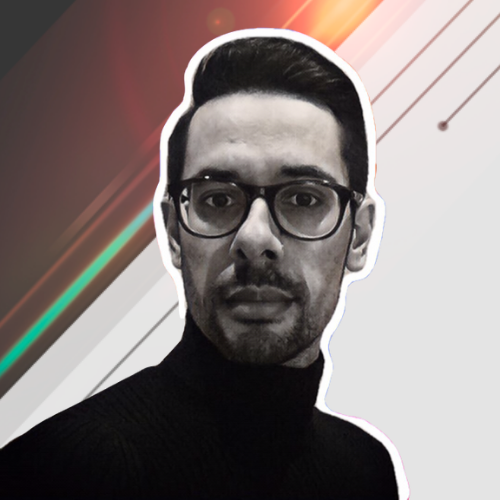
Hi Joe. I'm so glad to have you here with us today. As I read about your life adventure through a fantastic bio that you've shared with me I was wondering whether you're ever considered writing an autobiography?
It’s interesting because this is the third time in as many months that someone has asked me this question. Until recently, an autobiography is not something I had ever considered writing because I’ve always wondered what purpose it would serve? Am I writing this because it’s a good story to tell, inspiring others, perhaps even helping some people? Or is this an act of ego, narcissistic pursuits to inflate my own sense of Self? Maybe it’ll always be a mixture of both, no motive ever really ‘pure’; but does it really need to be? Perhaps I should begin the process. Who knows, maybe a publisher would take my story on?
I believe it can be an amazing book. The purpose for me would be to learn about life and culture through the eyes of the author. You had a different background than writing. Then in all the swings and ups and downs and all the experiences in life, what is it about writing that you pursued?
I’m a deep thinker. All day, every day, I examine the complexities and nuances of the world, internally asking questions as to why things are the way that they are. I read widely, and love delving into the works of ancient writers, voices that continue to feel relevant, loaded with truth about human nature. All that reflection is exhausting, and I needed to find an outlet. I began using preaching as that opportunity to share ideas and reflections, but it became apparent that churches aren’t looking for complexity of thought, or unanswerable questions. So I began writing a blog, which in turn became a theological/philosophical book, providing me the space and opportunity to clearly lay out my perpetual stream of thoughts. Poetry and fiction writing developed as a result of the passion and energy writing provided for me. And fiction felt like an act of freedom whereby there were no barriers or rules I needed to follow; theology has parameters and limits, and I have always tried to push past those, challenging such ideas. But that comes with a cost. With fiction I could write whatever the fuck I liked, creating any world or scenario I wanted to. It is that freedom, the opportunity for your imagination to go anywhere it likes, is why I love writing.
fiction felt like an act of freedom whereby there were no barriers or rules I needed to follow
That makes sense. How do you define your writing style?
A review of my first book—which is a theological and philosophical exploration of what it means to be human—described my writing as “beautiful prose.” I love language, crafting words together to create images and symbols that leave the reader feeling as though they have had an experience. As a writer, my go to fiction genre is horror, but whatever genre I write, I try and leave poetic trails through the story, moments that linger.
Can you tell us a bit about your latest book? What is it about and how did you publish it or will be publishing it?
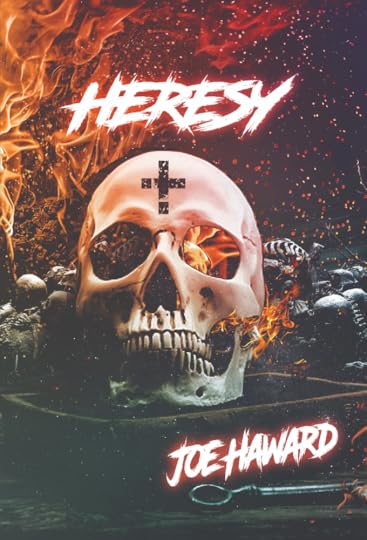
My latest book is called Heresy, published by Uncle B. Publication, a publisher committed to the pursuit of authentic voice. They are not interested in censoring, but in the freedom of language. Heresy is a brutal collection of poetry that explores the abuse and hypocrisy of institutional Christianity. I’m an ordained Baptist minister, so this collection is told as an ‘insider,’ sharing the truth of what I have seen and witnessed. At the end of the book I have written an Afterword, explaining something of my own story, and why I wrote Heresy. I’m tired of the abused and abandoned being silenced by the powerful. Each poem is a story within itself, highlighting various ideas, themes, and experiences. I’d love to hear people’s reflections and how they interpret each piece. My hope is that Heresy will provide victims of the church institution a sense of being heard.
Poetry or prose? Why?
I know I have just released a poetry collection, but I am going to choose prose. It’s not an easy decision because I love the way you can really play with words and symbols in poetry. For instance, I recently wrote a line that said, “The illusion of dreams, asthmatic aspirations wheezing on the polluted air of enlightenment.” But, personally, I find prose gives my imagination more of an opportunity to go to unimagined places. And I always try to use poetic language within my prose works. I’ve just written a story called, The Table, and I loved the challenge of creating a painful, poetic, and grotesque world set within a single room and nothing but a table. I hope it worked.
I agree with you. I prefer prose for the exact same reason. I saw your posts on your website mostly covering theology and philosophy. How can you connect such subjects with your fiction writing?
Yes, my articles use theological and philosophical ideas as a way of making commentary upon the world, particularly within politics. That might sound strange, but history rhymes, and human beings have a habit of repeating the same behaviors, over and over. Theology and philosophy, at least in the way I approach them, can provide insights into human nature. Those ideas make for great stories. My fiction writing might never explicitly use theological/philosophical ideas, yet they often bubble beneath the surface. For instance, I recently had a horror story called “Jack,” published over on The Quiet Ones. That story deals with ideas around memory and human identity, whilst also introducing monsters and blood!
I wonder what specific subject attracts you most?
I have studied the theory of scapegoating for a number of years. French literary theorist, René Girard, developed something called Mimetic Theory. He argues that all human behavior is imitative–I desire what you desire. Such desire leads to rivalry, that in turn leads to violence, namely, the expulsion and/or death of the scapegoat. Girard argues that religion and human communities can all be traced back through these ideas. It felt like an immensely significant moment when I discovered his writing. I was a religious fundamentalist, and then Girard’s work completely tore me apart, and transformed my understanding of religion, culture, and humanity. I’d love to write a novel that explored these ideas.
Insightful. This is all new for me. You mentioned about transgressive writing. How transgressive are you?
Some of my writing, especially stories coming out in 2022, are very transgressive, exploring ideas around taboo and sex. And, honestly, parts of the Bible are some of the most transgressive works ever written. Heresy, as a collection, is a work of transgressive poetry. It holds your face to uncomfortable truths, and breaks apart ideas of respectability and acceptability, especially in regard to what an ordained Reverend should be writing about. As a person, I do wonder what it even looks like to be transgressive? We live in a society of confusion, where identity, community, and humanity are unfathomable concepts. What does it even mean to break the rules of acceptable society nowadays? If I love my neighbor, pursuing compassion, acting with kindness, even to those who hate me, is that not a transgressive act? I will always be against the institutions though, whether religious, political, corporate. To me they represent the worst of power and human greed. My writing will often find ways to attack the corridors of power.
parts of the Bible are some of the most transgressive works ever written
I've heard that from our other interviewee ,Natalie Wigg-Stevenson that bibble includes such elements. Do you have any books you’re working on currently?
I am just wrapping up a transgressive story/poetry hybrid collection called Sweat and Blood Between the Cracks. I also have a horror anthology collection called Breath and Blasphemy coming out in September 2023. I also have a two-book fantasy horror novel that I’ve nearly completed. They are due out 2024/2025. There are another couple of books I’m also developing that I’m hoping will be out in 2024. So plenty to keep me busy!
Thanks, Joe. It's great news and looking forward to reading your works. Thank you so much for joining us Joe and hope for future collaborations.
If you're interested to know more about Joe please visit the following links:
Twitter: @RevJoeHaward
Instagram: @hereticwriter
Heresy (UK): https://www.amazon.co.uk/Heresy-Uncle-B-Publications-LLC/dp/1957034068/
Heresy (US): https://www.amazon.com/Heresy-Uncle-B-Publications-LLC/dp/1957034068/
All Printed Work: https://www.joehaward.co.uk/printed
April 29, 2022
Writer vs. Writer: Arya F. Jenkins
This post is a chat with amazing Arya F. Jenkins. A poet, flash, short stories writer. She has published in many journals and zines. Her fiction has received several nominations for the Pushcart Prize and one nomination in 2021 for the Best of the Net Anthology. Her poetry chapbooks: Jewel Fire (AllBook Books, 2012), Silence Has A Name (Finishing Line Press, 2015), and Love & Poison (Prolific Press, 2019) are my favorites. She also has a short story collection, Blue Songs in an Open Key (Fomite, 2018) and a mixed genre novel, Punk Disco Bohemian (NineStar Press, 2021). Soon, a second collection, Angel in Paris & Other Stories, is due out in 2022. So, who is this mysterious Arya?
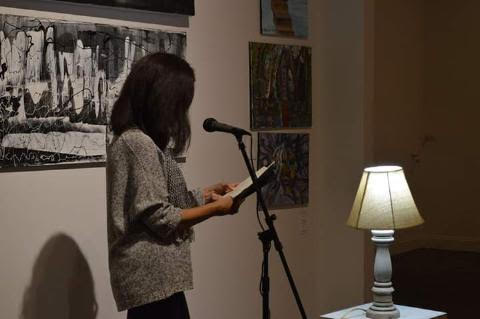
Hello Arya. It's wonderful to have you here. Let's start by telling us about yourself and how you became a writer?
Yes. I’m a Colombian American who lived in South America before moving here with my family in the mid sixties while still very young. My mother became a writer in this country, using English as a second language and I helped her as a reader, listener and editor in my early teens. I come from a legacy of writers, as my maternal grandfather, who was a judge in Colombia, also wrote books. My writing legacy is entwined with politics and governmental repression, something my familiars have historically addressed, in the courtroom and in prose. I am also a descendant on my mother’s side of the surrealist Andre Breton, who was a literary deviant. My mother and sisters and I were all avid readers and regularly discussed literature and politics growing up, so writing, in all the ways I did as a girl, journaling, writing poetry and compositions, evolved from this story-telling environment and from the awareness that to write was somehow dangerous or threatening.

In your website, I read that you categorize your books under the transgressive genre. Why is that?
Growing up in a very white upper class suburban landscape in Connecticut, I was acutely aware of my differences, which extended beyond my background to gender preference and to my political leanings, which are very much to the left. Everything I have experienced would seem to apply to the transgressive label. We write from the place from which we come and sometimes from a complicated relationship to those places and from the struggle to overcome.
That's very interesting but why did you decide to write in this genre?
Since one writes about what one knows generally, I really had no choice but to embark upon a study of diversity when I began looking at who I was and what I wanted to do with my life. We live in a world of differences in which mostly whites and those who think along prescribed norms have the upper hand--straight people get first serve; men continue to overpower women and even claim rights over their bodies, etc. It feels important to write about difference, and in my case, the struggles in which I have been steeped as a bicultural and someone who deviates in so many ways from the norm.
I also wanted to expand the notion of transgressive, which is somehow associated with badness—bad that is both good and not so good. All transgressives are not alike. I am not like Kathy Acker, for example. I don’t wear a leather jacket-- because I am concerned about the planet and animal rights. I consider myself a compassionate transgressive and those two ideas have generally been considered mutually exclusive.

Basically, I loathe labels and resist even the transgressive one, and so expanding it, diversifying to the point of blowing a reader’s mind, has definitely been my intent in my two published books, Blue Songs in an Open Key and Punk Disco Bohemian.
Blue Songs in an Open Key features stories inspired by jazz, bebop in particular, that stretch boundaries, stylistically and thematically. Punk Disco Bohemian, which is about a young multicultural woman’s search for her identity in a world in which women do not appear to have a place, pays homage to diversity while tossing its importance out the window even as it celebrates a unique time and place, Provincetown in the 70s.
About ,Punk Disco Bohemian,, what is it about?
It’s about a 17-year old, Ali, who is part North American, Argentinian and French, and who runs away from suburbia and a world that excludes her, to the one place she associates with freedom--Provincetown on Cape Cod. The story takes place in the mid 1970s, when women and gays in the U.S. were just coming to own their rights and power. It’s what I call memo-historical, part truth and fiction or mixed genre. In Provincetown and in New Orleans Ali’s sexual and other adventures lead to an awakening of sorts that helps her grow into a deeper awareness of her personhood, which includes her roots, both cultural and literary.
Where did you get inspiration for this book?
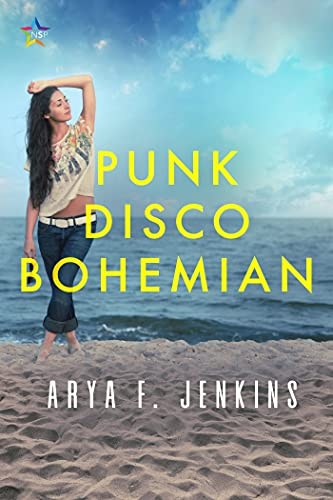
Most of my short stories as well as my novel have evolved from my own experiences, both in this country and South America. The process of creatively entwining imagination and reality has worked for me and continues to work for me as a writer. In doing so, I aimed to address the struggles of my youth while connecting them to the struggles at large that beset young women of my generation and in particular, queers and those who deviate from societal norms.
How do you think transgressive fiction can impact the queer community?
I think a celebration of difference is at the root of the transgressive idea, but, as you yourself have written in your blog, the transgressive notion far exceeds that of sexuality in writing. It’s a way of thinking and being that includes sexuality, but is certainly not limited to it. Within this genre we have to explore further what it means to be human beyond all the boxes, labels and ideas that society has imposed on us and that we have imposed on ourselves. Along with that, the queer community has to be explored more. What is it exactly? Maybe we are all the humans that we are in the moment and something different constantly that we can’t peg. Then what?
It’s a way of thinking and being that includes sexuality, but is certainly not limited to it.
As a writer, do you have any specific routines and habits?
No, not at this point. There was a time in my early 20s, when I was starting to write short stories and was working as a journalist, when I could easily spend 8-10 hours writing. I was discovering my relationship to language and it was deep immersion. But I’ve been at this writing practice a while now and am comfortable with it, so I sit down to write whenever I am moved to. Often reading inspires a poem or story and I may write it into a notebook or just head to my laptop and type out a first draft. The key with me is not being satisfied with the end result until I’ve given the story time to settle. As is true in life, nothing ever results exactly as I planned or imagined.
Which of your book characters is your most favorite? From which book and why?
That’s a great question. And I wish there was one, but to be honest, I have to say my experience is my favorite character since my characters have helped to shape my understanding of my experience and together comprise it. It would be very accurate to say that every one of my characters represents an aspect of me that I have tried to hone and evolve through my writing. In “So What,” the story that launches my collection, Blue Songs in an Open Key, a rebellious girl struggles to relate to her absent father. Her rawness and potential come to further fruition in the main character of the last story, “Lulu and Me,” in Blue Songs in an Open Key, about a young woman’s sexual fling with a blues singer in Provincetown and New Orleans. Both stories provided the main literary inspiration for Punk Disco Bohemian and the character of Ali, who is a composite of the main characters in each of those stories.
Do you think the hyper-sensitive world of today is the enemy of transgressive writers? Why or why not?
I personally pay less attention to who is my enemy and more to who is my friend in the literary world. Who is interested in reading about the people I care about, most of whom are left of center, outcasts, queers, people with unique experiences and ideas trying to thrive in a world that has largely excluded them. Of course it’s true that if the literary world were more accepting, most of my friends who write and I would be struggling less to get published and to make money at what we do. We would have the acceptance and hunger for our work of the big publishing houses, which want best sellers and marketable people promoting their books, people who are often more interested in pleasing than in saying what is true. Ultimately, what matters is the quality of a work, even if it’s not celebrated by the mainstream. It’s possible to be both proactive and provocative in one’s writing and I would rather view my journey as a bridge than a wall.
Thank you Arya for joining us today. You're an inspiration. Write on!
If you're interested to get in touch with Arya, here's some contact links:
,Amazon ,Blog ,InstagramApril 22, 2022
Writer vs. Writer: Viktor Redreich
Today we will interview one of the masters of erotic fiction. Yup! you've read it correctly. Viktor Redreich has written over 30 books read more than a million times. On his website, on the about section, it is written that such fame resulted in "readers found him on social media and started bothering him in the middle of meetings. They found out where he worked and started bothering his secretary. And when Viktor refused to pay any attention to his pesky readers, they found the names of Viktor’s friends and started bothering them instead. So Viktor did what any sane person would do. Delete the goddamned book." what happens next? You're gonna read the interview to discover.

Mr. Bare chested hero. Viktor. Thanks for joining us today. Tell us about who you are? How did you decide to become a writer?
I was forced to, almost at gunpoint. For years I’ve been resisting putting pen to paper, but demonic entities kept conspiring to make my life utter hell until I started writing. For some goddamn reason, as long as I’m writing, every area of my life goes great, but as soon as I stop, it all tumbles into chaos and despair. I don’t want to write. I just don’t have a choice. I’m cursed. Help!
Writing is frickin’ dangerous, you know that? The ability to organize your thoughts, to articulate and express yourself, the ability to influence the masses? This is the stuff of fascists and dictators. I spend plenty-a-time at the gym working on these toned abs but lemme tell ya, if you had to pick one person to get into a fight with: a writer or a boxer, go up against the boxer. The writer will demolish you before can even make a fist. A buff body ain’t got nothing on a buff mind.

Writing is a curse for sure! Why erotic fiction? What is interesting about this genre?
Good writing is hypnotic. There’s no difference between getting sucked into a well-written chapter and getting pulled into a hypnotic trance. And if you add sex to it? If you add sensuality to it? If you ramp up the emotions and get your reader squishy wet and squirmy? Oh lord that’s some powerful stuff. It will get you hooked like nothing else can.
Wanna know why? Because unlike watching a movie, reading a book is an active experience. When reading a well-written book, you’re constructing sensations, sights and sounds in your mind, and your body is physically reacting to them. Your breathing hastens, your toes curl, your abdomen clenches. It’s as vivid and real as real life. Not even the metaverse can compete.

How different is erotic fiction from romance fiction with exotic elements?
I don’t actually write erotic fiction. Erotic fiction is usually very short, no more than a couple thousand words. I write big, thick, throbbing, full-length novels that just happen to be dripping with filthy sex.
I wouldn’t classify what I write as romance either, although there certainly is a good amount of flirting, angst, heartbreak and can’t-live-without-you passion involved.
Perhaps the best way to classify my books is to call them forbidden, taboo, or controversial novels built around lovey-dovey, heart-fluttering plotlines jacked up with insane amounts of freaky bonking.
Good writing is hypnotic.
What makes a good erotic story? What are the elements?
My readers tell me that what draws them in are the details and the emotions. It’s not enough to simply describe what happens. Doing that makes your work as exciting as a biology textbook.
What you need to do is get under the skin of the characters, expose them for all their flaws, insecurities and animalistic urges. You have to keep your characters raw, on edge, and conflicted, the way all normal humans are.
That said, I haven’t read much erotica so I don’t know if this is how any other writers see it. It’s just how I do things.

I guess every writer has their own style. What is the most powerful or popular type of character in erotic fiction?
I'll give you two: dominant older men corrupting innocent younger women.
I don’t know if it’s the most popular of all, but it’s certainly what my readers keep demanding of me.
I wrote one such book long ago and ever since then my readers have continued to demand more and more (and more). I’m up to two dozen such books now.
My readers tell me that what draws them in are the details and the emotions.
Wow. That's an interesting fact to know. How and where do you publish?
I’ve got a bunch of free books on my website and a few taboo titles on Smashwords, but the bulk of my work is on Amazon. Most of my income comes from e-books read on Kindle Unlimited.
How can you write so many books in a short period of time?

I’ve got these magic fairies who come to me in the middle of the night. They read my roughly-written first drafts and turn them into well-written second-drafts for me to polish into frickin’ masterpieces.
And by “fairies who come to me in the middle of the night” I mean a team of writers in the US and UK who I’ve been training over the years. They write in their time zones (while I sleep) for me to tweak and refine the very next morning. It’s an efficient process. The second draft is usually the most time-consuming, so being able to have an experienced writer crank that shit out saves me plenty of time and allows me to publish dozens of books every single year.
Please send some of those fairies my way! What are tools do you use to ease your writing journey?
Aside from my big veiny cock that goes out and bangs all them hoes in the name of research? Atticus for formatting, Bookfunnel for sending out lead magnets, ConvertKit for world-class email marketing, BookSprout for gathering reviews, and UpWork for finding freelancers.
Oh lord! That should be a hell of stamina. So, who is your target audience?

Women. It’s the fairer sex that makes up 99.6% of my readers. Mostly 25-45 years old, and mostly in the US and UK.
In terms of psychographics, I’d say what my readers have in common is a thirst for uncovering forbidden secrets, a craving for intimacy, and the need for a secret, hidden part of their lives where they can be as debaucherous as they need to be without being judged for it.
What are your goals for the future in the industry? Do you think you may shift to another genre?
I’m looking into audiobooks, short films, podcasts, and possibly creating exclusive content on subscription platforms like Patreon, but these are all just theoretical for the moment. There are still mountains upon mountains to be conquered in the written fiction space.
Fantastic. Thank you, Viktor to join us today and sharing your amazing experience as an erotica writer with us. If you'd like to know more about Viktor, check out the following links:
April 19, 2022
Fonzi's Jacket, Archie Bunker's Chair and Richer Expressions of Literary Cubism
I visited Washington, D.C. on a quest last week. I wanted to see Fonzi's jacket at the Smithsonian's American History Museum. I failed. I never found the jacket.
Instead, I found: Archie Bunker's chair; Dorothy's ruby slippers (yes, the heels were clicked together); the original Muppets; and Catwoman's leather outfit. I moved along the National Mall under cloudy skies, sneakers crunching over the softly pebbled walkways, walking into the Natural History Museum where I saw the Hope Diamond and an array of other gems and minerals. I then made my way down to the National Gallery, paced the many halls and rooms to stand before the creative progeny of Rodin, Monet, Van Gogh and Picasso.

It was here at the National Gallery of Art, through the accident of free-form milling and through the failed quest to find Fonzi's jacket, that I discovered new perspectives on literary cubism. The small exhibit tucked into a small corner of the sprawling museum was titled "Text as Inspiration: Artists' Books and Literature." Intrigued, I entered the area and studied the fourteen artists' books on exhibit. The books were cubist in that their authors employed various modes of artistic expression to tell a story; the individual cubes of art became building blocks that converged into a thematic whole.
The form of literary cubism that I use in my writing is limited to various modes of written expression. I've used poems, letters, e-mails, government and legal memoranda, news articles and even automated spreadsheets as the cubes or building blocks of fiction. The books in this exhibit transcend the use of words as a sole means of expression. These books couple words with visual and tactile formats, giving the reader a synthesis of text, image and form.
Hmmmmm.
Have I unnecessarily and blindly shackled the expressive components of literary cubism in my practice of fiction writing?
Yes, I have.
One of the texts on exhibit was Sandra McPherson's book of poetry titled "Eve" In it, the author includes a thematically relevant papier-mâché sculpture of Adam's rib covered in a feminine black veil. The text of the book falls out of the sculpture in an accordion-like fashion.
Literary cubism is a potent and provocative technique for creating fiction. A richer and perhaps more expressive mode of this technique goes beyond the use of only words. Literary cubism gives full license to inclusion of visual and tactile formats.
Article Source: https://EzineArticles.com/expert/Mohamed_Mughal/588622



